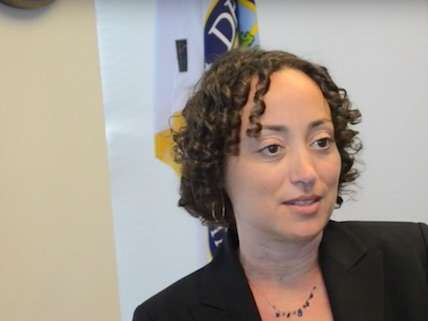Five Years After Feds Escalated the Title IX Inquisition, Are Students Ready to Sue?
The Foundation for Individual Rights in Education says the Office for Civil Rights broke the law.


It's time to settle the campus speech and sex wars once and for all—in a court of law, says the Foundation for Individual Rights in Education.
As I previously noted, today marks the fifth anniversary of the infamous "dear colleague" letter that initiated the federal government's current crackdown on free expression and due process on college campuses. On this day, five years ago, the Education Department's Office for Civil Rights advised colleges and universities that they would lose federal funding if they did not strengthen their efforts to protect students from sexual harassment and violence.
OCR's authority stems from Title IX, a one-sentence-long federal statute mandating gender equality in higher education. The Obama administration's OCR team, however, has interpreted Title IX in a manner that gives the agency seemingly limitless power to compel universities to follow speech-suppressing policies. The dear colleague letter, for instance, obligates universities to adjudicate sexual misconduct using a preponderance of the evidence standard, even though this dictate cannot be found within Title IX itself. OCR is essentially making up rules to advance its agenda that fall outside of the scope of the law, critics contend.
Enough is enough, says FIRE. The organization is asking a student or institution to sue the agency directly—and will pay all relevant legal fees:
Five years ago today, the Department of Education's Office for Civil Rights (OCR) announced sweeping new requirements for colleges and universities adjudicating allegations of sexual misconduct. By unilaterally issuing these binding mandates via a controversial "Dear Colleague" letter (DCL), OCR ignored its obligation under federal law to notify the public of the proposed changes and solicit feedback.
To correct this error, and to begin to fix a broken system of campus sexual assault adjudication that regularly fails all involved, the Foundation for Individual Rights in Education (FIRE) seeks a student or institution to challenge OCR's abuse of power. FIRE has made arrangements to secure legal counsel for a student or institution harmed by OCR's mandates and in a position to challenge the agency's violation of the Administrative Procedure Act(APA). In keeping with FIRE's charitable mission to advance the public interest, representation will be provided at no cost to the harmed party.
FIRE's argument is that OCR has violated the Administrative Procedure Act, which requires agencies to make new rules available for public scrutiny before they go into effect. Since OCR never gave the public a chance to weigh-in on the preponderance of the evidence standard, the agency violated APA, according to FIRE.
When cornered on this question, OCR has suggested that its guidance isn't actually mandatory, meaning that it hasn't violated APA. Of course, the guidance certainly looks mandatory to the hundreds of institutions meekly submitting to it.
The law firm of Kaiser, LeGrand & Dillon is prepared to represent the student or students who answer FIRE's call for a lawsuit.
"For months now, people have been asking how OCR could possibly think it had authority to essentially take over campus sexual misconduct proceedings nationwide simply by sending out a letter that no one in the general public got to look at before it went out," Justin Dillon, a partner at the firm, wrote in an email to Reason. "We're obviously thrilled to partner with FIRE and see if we can finally make OCR answer that question."
Interested students can contact FIRE at APA@thefire.org.


Show Comments (80)